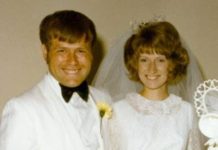“Shaking the Gates of Hell: A Search for Family and Truth in the Wake of the Civil Rights Revolution,” by Pulitzer Prize-winning Alabama Media Group columnist John Archibald, will be published by Knopf on Tuesday, March 9. The son of a long line of Methodist preachers, he has written a powerful memoir about family, faith, and the long struggle for social justice in the South. Throughout, he interrogates what it means to have a pulpit during turbulent times and how each of us can use our voices to serve a greater purpose.
AL.com and Books-A-Million will host a live Q&A with John Archibald at 6:30 p.m. Tuesday, moderated by Alabama icon Wayne Flynt and Reckon Interview hosts John Hammontree and R.L. Nave. The event is open to ticketed guests for a $34 fee, which includes a signed copy of the book shipped to your home. To register, go to https://www.crowdcast.io/e/johnarchibald/register
Below is an excerpt of his memoir.
I was born in the midst of revolution.
The son of a preacher, the grandson of preachers. The great-grandson of preachers, too. They were all Methodists – until you look beyond the Civil War. They preached on horseback and on foot and – in my dad’s case – in a little white Fiat Spider. They preached of right and wrong and grace and goodness and believed it, I think, to their bones. They preached of stewardship – which means “pay up” in Methodist speak — and dutifully passed the collection plate for missions in faraway places and building funds at home. In the name of God and something they called sanctifying grace they preached in the Old South and longed for a New South, but were silent, too silent, on the complicit and conspiratorial South I never came to see until I was fully grown
I was born in Alabaster, Alabama, then a little crossroads outside Birmingham with a Methodist church and a Baptist church and a set of railroad tracks that gave it reason to be.
I was born on April 5, 1963, in the blissful and willful ignorance of the white South. I never knew, until much later, that as my mother went into labor the foot soldiers of revolution gathered across the county line, that at the moment of my birth Birmingham readied for a battle that was long overdue. The Rev. Dr. Martin Luther King Jr. had not yet put his Dream to words, but he had come to this town to change the world with another masterpiece.
Birmingham – white Birmingham – didn’t like King’s arrival. Not the merchants who mourned the lost dollar or the cops who demanded obedience. Not the Klansmen who longed for the way things used to be or the preachers who feared the noise and glare and shining incongruities, who wanted so badly to stuff the powder back in its keg that they never saw the explosion coming. Even as they lit its fuse.
I was born in the midst of revolution. And I didn’t even know.
A week after my birth, eight clergy members, Christians and Jews, printed a letter in The Birmingham News asking for the demonstrations to stop in the name of law and order and “common sense.” Eight white Birmingham men of God stood for the status quo.
King read their words and understood exactly what they meant. It was the past coming for the present, a call to do nothing, again, to slow the roll of justice in the name of peace. It was cowardice masquerading as reason. Silence in the guise of God.
Martin Luther King Jr. read that letter and decided he would march in Birmingham, even as friends advised against it. He was too important, they said. Tensions were too high, Birmingham was too hot. They warned him he could be hurt, or killed, or kept in jail for months by Eugene “Bull” Connor’s police department. But he marched, and was arrested a few hours later. It was Good Friday – the day Jesus was hung to die after being betrayed by silver and silence. It was April 12. I was seven days old.
King was charged with parading without a permit, a crime deemed serious enough for solitary confinement. They put him in one cell and his colleague Rev. Ralph David Abernathy in another. And there they stayed. For days.
Connor, an active Methodist, thought Birmingham could keep King silent. Connor wanted him silent. Because silence is safe, and law-abiding, and powerless. Silence doesn’t march, or demonstrate, or demand justice, or force you to see yourself. Silence vanishes. Into the night, like those men in hoods in their ’57 Chevys with whip antennas bent double.
But what came out of that cell spoke louder than King ever had, up to then. What came out changed the city and the world and screamed with a voice that would not be silenced.
Legend has it King began his “Letter from a Birmingham Jail” — what many think of as the most powerful written document of the civil rights era — on the margins of newspaper scraps. It was the best recycling ever. He finished the rest in a notebook somebody slipped him inside, and the pieces were assembled like a jigsaw puzzle by King’s friend Wyatt T. Walker.
The words were loud, and strong, and righteous.
I never read them. Not in Birmingham schools in the 1970s or my dad’s churches or in history classes at the University of Alabama in the 1980s. They were not assigned or recommended in classes I took. I never read them until I got my first newspaper job at The Birmingham News in 1986 and needed to know the story of the city’s past.
The date of the letter was never lost on me. It was April 16, 1963. It was 11 days after my birth, 23 miles from the hospital where I was born.
I came to love that letter, for it was bold and spoke in phrases I could pretend to claim, in the way a white person of privilege might foolishly want to do:
I am in Birmingham because injustice is here.
Yeah.
I cannot sit idly by in Atlanta and not be concerned about what happens in Birmingham. Injustice anywhere is a threat to justice everywhere.
Can I get an amen?
We are caught in an inescapable network of mutuality, tied in a single garment of destiny. Whatever affects one directly, affects all indirectly.
We are. It does.
I wanted it to be mine. I tried to claim it. It was my town, the time of my life. But it would take a long time to find my place in it. And not the way I thought. Because the point of the letter did not emanate from the lyrical phrases that would become memes for justice. The point of the letter was, in many ways, the rebuke.
For retreat, in the name of peace.
For obedience, in the name of law.
For silence, in the voice of God.
The point of the letter was shame and disappointment, and a truth so deep and ingrained that some people look at it a lifetime and never see it at all. The point of this letter was not a message to Black people who lived the struggle and knew the barriers and blockades. It was to cautious and careful white people, like those eight clergy members — the Waitful Eight, some call them — to whom King addressed the letter.
Like the members of my family, who thought they understood. It was to people just like mine, who tried to live like Jesus but turned the other cheek to look away.
Alabama Media Group and Books-A-Million will host a live conversation with John Archibald to celebrate the launch of his new memoir, “Shaking the Gates of Hell: A Search for Family and Truth in the Wake of the Civil Rights Revolution.”
Dad was not a tall man. Five-foot-eight, tops, with a crooked smile and sparkling eyes and a head that was bald on top long before I was born.
People remember that sparkle. And the way he’d stand behind the pulpit beaming, belting out the old Methodist hymns and bouncing — bouncing up and down on his tiptoes — as if he could not contain the spirit inside.
He might have done that because of his height, to seem somehow larger before his flock, but I don’t think so. I think it was pure joy. He was in his place, in his space, carrying on the family business in a life that seemed predestined. When he sang of his God and grace and faith he was home, where the rules were clear and goodness was written in a book validated by all of his favorite philosophers and theologians. And his heart. In his pulpit he could be sure, and never more than when he sang the jubilant hymns of Charles Wesley, the prolific brother of John Wesley, who founded Methodism:
O for a thousand tongues to sing my great Redeemer’s praise, the glories of my God and King, the triumphs of his grace!
When I close my eyes I can see him in that pulpit, oblivious and joyful. And loud. Because that’s where all the worries of his life were stripped away. That’s where he could forget the illness of his wife or the missteps of his children. In that moment he did not have to be burdened with the sick and the dying in his congregation, or the demands of the bishop, or the Pastor-Parish Relations Committee, or the gossips who might stop by the parsonage just to see if our new St. Bernard, Bubbles, was too hard on the furniture.
But when I really think of Dad he is not in church. He is at home, picking chords on a baritone ukulele, singing old cowboy songs to my mother:
Come sit by my side if you love me, Do not hasten to bid me adieu, Just remember the Red River Valley,
And the cowboy who loved you so true.
I remember him with a harmonica in his mouth and a grin somehow still on his face. I think of him standing on the sidelines at Banks High School in Birmingham, watching me practice with my football team, interested but not interfering.
I think of him marching into the bathroom at my sister’s high school with cleaning supplies to erase her name and number scrawled in a stall by some teenaged punk. I think of him as a scoutmaster who remained for all his days an Eagle Scout. I think of him loving and accepting his children even when all four of them did things that caused him agony.
Mostly I think of my dad in the outdoors, identifying birds and writing them down in a little spiral notebook he carried in his pocket. I think of him camping in a big blue tent, for he did not believe in hotels. He came from the same school of Methodism as the Finches in “To Kill a Mockingbird,” after all. The ones, as Harper Lee put it, wary of “doing what was not for the glory of God, as the putting on of gold and costly apparel.” Or staying in extravagant lodgings when a tent was closer to nature anyway, and nature was – it went without saying, as so many things did — closer to God.
Where I was closest to Dad, where I prefer to think of him most, is on a smooth little lake in the North Georgia mountains, with songbirds singing and dawn breaking to burn away the mist. We fly fished there, most every year, in a canoe that he, most often, paddled silently as I fished.
Dad taught me with a chartreuse popping bug, a little wooden fly with rubber bands for wings. He taught me as a child – patiently – how to tie the fly onto the leader, how to draw out my line and whip it, all in the wrist, so it swept over the water like a flying insect and dropped, gently, inches from the bank, where the little bass and bream gathered. If the flight is right the fish will take notice before it even hits the water. And then with a little tug and a little shake, you make it judder through water until – whoosh! The surface explodes with fish and fins and fury.
Fly fishing on a lake is far different from what you see in rushing water, from the “River Runs Through It” ballet of trout and waders and baskets and hand-tied flies. It is less an art, perhaps, but there is rhythm to the dance of fly fishing from a boat. Dad — like Norman Maclean — said fly fishing was like life. Patience and persistence and attention to detail and peace – and a thrill you cannot imagine.
In the South most anglers like to fish for large bass with a spinning rod, which can be tricky. You must feel the fish, be one with the fish, keep your line taut and set the hook at just the right moment, or the bass will make you look a fool. With fly fishing though, there’s no mistaking the intent of the fish. When it strikes, crashing the surface of a mirrored lake, the moment is obvious and unforgettable and heart-racing.
It’s a burst of adrenaline and a shock to the system. Oh, you still need patience, or you will, as the fish breaks the water, react so violently you snatch the bug right out of its hungry mouth, sending it – and the hook — like a heat-seeking missile in the opposite direction.
One of the first times Dad taught me fly fishing I yanked my line out of the water too soon, and to make matters worse jerked it straight toward my father. It soared over his head. When I realized my mistake I whipped the tip of the rod forward again. The line, and hook, changed direction and whistled through the air until it landed — thwack – right in the middle of Dad’s bald spot. A big, bloody, bald bullseye.
I don’t recall exactly what he said. For Pete’s sake, probably. Or Bless Patty. Not much more, I think, for he was a taciturn man. But he paddled to the bank to assess the damage. He told me to push the hook through the scalp and cut off the barb with the pair of dirty needle-nosed pliers he kept in his tackle box. I could not do it, and I cried.
Because I hurt him. Because I didn’t have the strength to help him. Because I feared this thing we shared would be ruined by my own ineptitude.
He laughed, and scobbed my knob, as he called it, grabbing me by the neck and running his fist playfully through my hair. He told me not to worry, that there were still fish to catch. Sometimes you get stuck and sometimes you do the sticking, but you don’t stop. He handed me a new chartreuse fly and watched as I tied it to my line just so. He paddled silently back out onto the lake, smiling, with my fly still embedded in his head.
Excerpted from “Shaking the Gates of Hell,” published by Alfred A. Knopf, an imprint of The Knopf Doubleday Publishing Group, a division of Penguin Random House LLC. Copyright © 2021 by John Archibald.
Credit: Source link































